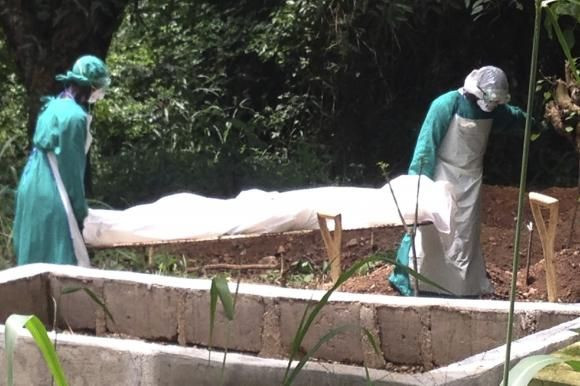American Tests Negative For Ebola In Ghana, But Fear Of Spread Remains

An American citizen who was quarantined in Ghana's capital city of Accra tested negative for Ebola, after fear spread that he may have been the first person to carry the deadly disease into the city.
The revelation that the man did not have Ebola helped to quell fears of the spread of a persistent, highly deadly outbreak in West Africa that has killed more than 460 people so far after emerging in Guinea in February.
But officials say that the road to ending the outbreak of this particularly dangerous form of the virus -- it killed more than 90 percent of its victims in Guinea, Sierra Leone and Liberia -- remains difficult. Health officials and governments face significant challenges in their efforts to eradicate the disease.
"[T]he Ebola epidemic is unprecedented in terms of the geographical distribution in West Africa and the numbers of cases and deaths," Doctors Without Borders spokesman Tim Shenk said via email on Monday.
"The number of cases has increased, in part, due to a lack of understanding among the public regarding how the disease is spread. For example, people have often attended funerals where infection-control measures are not implemented. Local communities are still very frightened of the disease, viewing health facilities with suspicion."
The Red Cross suspended some of its Ebola efforts temporarily last week when staff members were threatened by knife-wielding locals in Guinea, Reuters reported. The incident was seen as an outgrowth of fear among local communities; their ignorance and refusal to follow basic steps to help stop the virus from spreading is also a major challenge.
Health officials want to curtail traditional funerals, which require relatives to touch the bodies of the dead, because of the risk of spreading the disease. And they want potential victims immediately quarantined so they do not spread the infection to unprotected relatives and caretakers. Luckily, Ebola mostly spreads via contact with body fluids, which has helped to contain the disease's spread.
Still, the World Health Organization held an emergency meeting last week to find ways to address the outbreak, and Doctors Without Borders warned in a late June statement that "it has reached the limit of what it can do to fight the deadly outbreak."
Officially known as Médecins Sans Frontières in French, Doctors Without Borders is the only organization treating Ebola victims in the current outbreak.
“The epidemic is out of control,” Dr. Bart Janssens, the organization's director of operations, said in the statement.
“With the appearance of new sites in Guinea, Sierra Leone and Liberia, there is a real risk of it spreading to other areas. ... We have reached our limits. Despite the human resources and equipment deployed by MSF in the three affected countries, we are no longer able to send teams to the new outbreak sites.”
But the man recently identified as a potential Ebola victim in Ghana tested negative for the disease Monday, as was also true when another individual was tested for the disease back in April.
The man, whose identity has not been released by authorities, remains at the Nyaho Medical Center in Accra, where he continues to undergo testing.
"It is negative," Dr. Badu Sarkodie, the Ghana Health Service's chief of disease surveillance, told Reuters Monday, speaking about the man's Ebola results.
But Sarkodie told Ghana's Joy News in an unconfirmed report that the results of the test were in fact only "tentatively negative," as of Monday.
"What it means is that whatever they [scientists who tested blood samples of the suspect victims] have done is not complete and there is the need for follow- up tests," Sarkodie said, according to the news outlet.
Four of the medical center's staff members who had contact with the American are currently quarantined and under observation for signs of Ebola, Joy News added.
The arrival of Ebola in a major city like Accra or Lagos, Nigeria, with an international airport with direct flights to Europe and the United States, strikes fear in the hearts of many people around the world, who worry about a "Hot Zone" epidemic spreading far beyond Africa.
In April, when fears emerged about the potential for the disease to spread beyond West Africa, Dr. Anthony S. Fauci, director of the National Institute of Allergy and Infectious Diseases at the National Institutes of Health, told IBTimes that such concerns were misguided
“Yes, you could see it go from Guinea to maybe Sierra Leone or to Liberia, but the idea of it all of a sudden spreading throughout the world the way influenza spreads, that’s just not the way Ebola spreads,” he said, adding that “if they’re afraid of a worldwide epidemic, there’s very little chance of that. … Ebola doesn’t work that way.”
But now, more than three months later, the World Health Organization (WHO), Doctors Without Borders and other organizations are still fighting to end the outbreak. WHO, the National Institutes of Health and the Centers for Disease Control and Prevention all either declined to comment or did not respond to requests for comment for this story.
“The WHO, the affected countries, and neighboring countries must deploy the resources necessary for an epidemic of this scale,” Janssen said in the late June Doctors Without Border statement. “In particular, qualified medical staff need to be made available, training in how to treat Ebola needs to be organized, and awareness-raising activities among the population need to be stepped up. Ebola is no longer a public health issue limited to Guinea. It is affecting the whole of West Africa.”
© Copyright IBTimes 2024. All rights reserved.





















